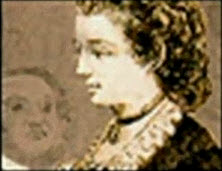1848, Salem, Massachusetts
The sails on the schooners slapped in the gusty spring wind as Mary
Upton Ferrin made her way to the office of Samuel Merritt, "the honest lawyer of
Salem". She introduced herself and inquired in regard to the property rights of
married women and the divorce laws.
Merritt's advice was not encouraging.
She learned that in 1848 "the whole of the wife's personal property belonged to
the husband, as also the improvements upon her real estate; and that she could
only retain her silver and other small valuables by secreting them, or proving
them to have been loaned to her."
The laws of Massachusetts, like the laws of
most states, were based on the old Common Law idea of a wife's subjection to the
husband and that interpretation would likely be applied to any married woman
compelled to retain any portion of her own property.
She took the omnibus back to the square in
the southern village of Danvers and walked to her Aunt Phebe King's home in the
area off Lowell Street known as "The Kingdom". Betsey Upton King, Phebe's
sister, was also in the parlor when Mary presented a straight forward
report of the substance of the conversation she had had with Merritt.
Phebe at once became deeply interested
saying, "If such are the laws by which woman are governed, every woman in the
state should sign a petition to have them altered".
"Will you sign one if drawn up?", queried Mary.
"Yes," replied Phebe, "and I should think
every woman would sign such a petition".
There was no question of her resolve to
separate her life from him, no matter the cost. Betsy suggested that Judge
Benjamin C. Pitkin, a state senator from Salem, possessed sufficient influence
to have the laws amended without the trouble of petitioning the Legislature.
The women "were strong in their faith that the enactment of just laws was the
business of legislative bodies", and they believed all they had to do was "bring
the injustices to the notice of a lawmaker in order to have it done away".
Mary wrote to Judge Pitkin,
approaching him respectfully with her cause. To their infinite
astonishment, he replied: "The law is very well as it is regarding the
property of married women. Women are not capable of taking care of their
own property; they never ought to have control of it. There is already a
law by which a woman can have her property secured to her...But, not one in
fifty knows of the existence of such a law. They ought to know it; it is
no fault of the law if they don't. I do not think the Legislature will
alter the law regarding divorce. If they do, they will make it more
stringent than it now is."
The response did not dishearten
her or prevent her from drawing up the petitions herself and circulating them.
She became a sort of town crank, somewhat of a joke, but filled with a
dedication and intensity of purpose that gave her a certain charm. She
walked the streets gathering "many hundred signatures of old and young....Many
persons laughed at her, but known it to be a righteous work, and deeming
laughter healthful to those indulging in it", Mary continued circulating her
petitions.
Rev. John M. Usher, a
Universalist minister of Lynn, and a member of the lower House of
Representatives, presented Mary's petitions to the Legislature, but too late in
the 1848 sessions for action. Even though they were not acted upon, her
petitions formed "the initiative step for Woman Suffrage in Massachusetts".
